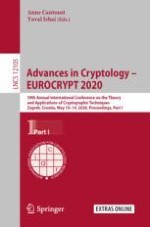2020 | OriginalPaper | Buchkapitel
Lower Bounds for Leakage-Resilient Secret Sharing
verfasst von : Jesper Buus Nielsen, Mark Simkin
Erschienen in: Advances in Cryptology – EUROCRYPT 2020
Aktivieren Sie unsere intelligente Suche, um passende Fachinhalte oder Patente zu finden.
Wählen Sie Textabschnitte aus um mit Künstlicher Intelligenz passenden Patente zu finden. powered by
Markieren Sie Textabschnitte, um KI-gestützt weitere passende Inhalte zu finden. powered by
Abstract
 .
.